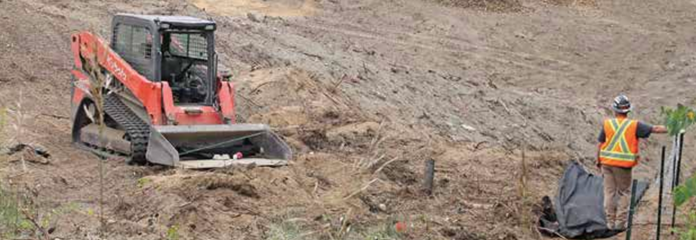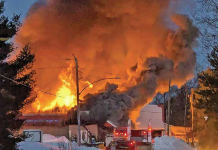A consultant has told Minden Hills council that to support the development of four proposed sites in the village, upgrades will be required at its wastewater treatment plant.
Engage Engineering was hired to assess the available capacity in the Minden sewer system, reporting its findings at a Sept. 25 meeting.
One site has already been approved, with three others in the pre-consultation phase.
Council has already approved a 35-unit affordable housing development on the Gull River by the legion. The other proposed sites are: a development with 222 apartment units, 18 townhouse units, commercial spaces and recreational facilities; two commercial buildings; and a 60-unit condo development.
Coun. Tammy McKelvey wanted more information on the proposed developments, saying she did not know about them. However, director of public works, Mike Timmins, said the planning department had instructed him not to disclose the locations due to confidentiality.
The existing system comprises one wastewater treatment plant with a capacity of 945 cubic metres per day; two sanitary pumping stations with force mains and a network of gravity sewer.
The firm said the existing average daily flow is 774 cubic metres per day, or 82 per cent capacity. There is residual capacity of 171 cubic metres per day. However, they said the estimated average daily flow from all sites would be 729 cubic metres per day.
“The treatment plant can accommodate one of either sites one or three within its current capacity. Upgrades will be required to accommodate the remaining sites,” a written report to council said.
However, they said the sanitary pumping station on Orde Street could handle the new developments, with no upgrades required.
The sanitary pumping station on Invergordon Avenue would need an upgrade to accommodate one of the sites, Engage Engineering said.
They further said the gravity sewer should not be over capacity, but upgrades may be required if all developments go ahead.
As for next steps, the Ontario Clean Water Agency will do flow monitoring at three locations downstream of two of the sites to confirm whether there is a need for gravity sewer upgrades. “It is expected that the flow monitoring results will show no capacity constraints in the gravity sewer,” the consultants said.
The township will also have to complete an updated topographic survey of the gravity sewer.
Timmins told council “I don’t want to jump to this idea that we have to look at expansions. We want to look at efficiencies; what we can do to potentially not have to expand the footprint. It’s an older plant … maybe there is something we can do to create efficiencies in there to claw back some of that capacity.”
Mayor Bob Carter asked what percentage of the flow is stormwater. Timmins said it was difficult to say, but part of the proposed flow monitoring next year could help them calculate that.
Carter noted that the possible extension of the long-term care home in Minden had not been included in the capacity study.
McKelvey said she had “serious concerns” the report did not include the Haliburton Highlands Health Services’ long-term care expansion. “We’ve known about it and supported their master plan and have had discussions with them, so I just don’t understand.”
Timmins said they have been requesting flow data from HHHS, but do not have that information yet. “When we have additional information, we will revise this, and come back for further discussion.”
McKelvey said they know from the master plan that HHHS is talking about 98 additional beds, 30 extra staff, 72 bathrooms and five tub rooms, so wondered if that was not enough information to do a calculation.
CAO Cynthia Fletcher said they could follow up with HHHS. She suggested this was the first of many discussions about utility capacity in the village. Council received the presentation as information only.





